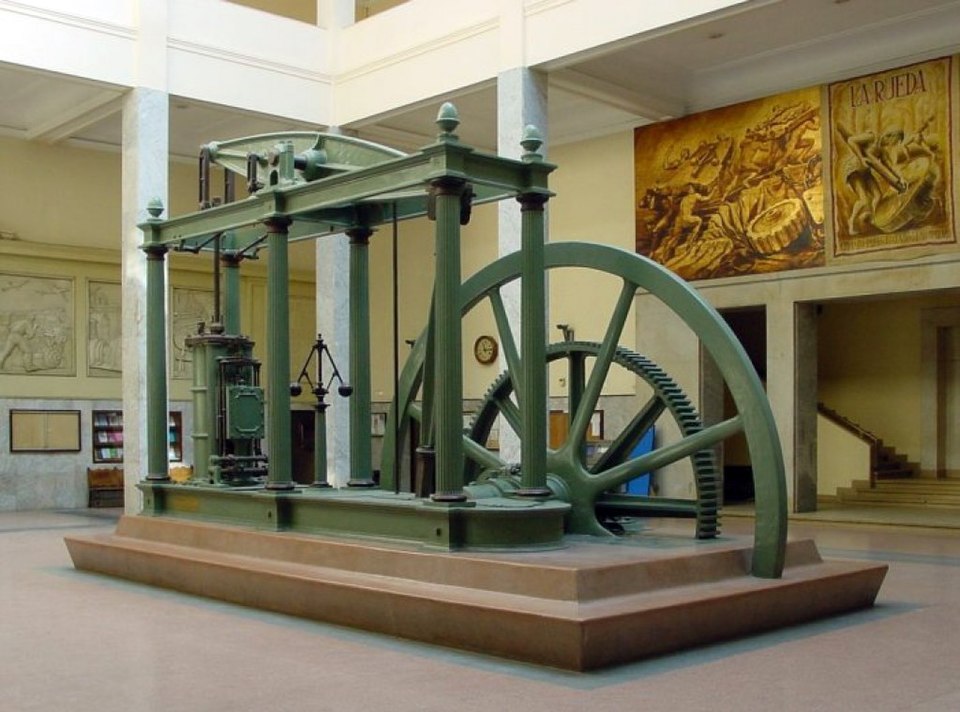
Why did the Industrial Revolution start in Britain? Nobody can say for sure why the Industrial Revolution started in Britain rather than somewhere else, but there are several likely theories. Britain had easily accessible resources, a large empire to provide resources and a market, a stable political system, an efficient agricultural industry, a respect for scientific theory, and a desire to be more powerful.
Some people say that the Industrial Revolution started in Britain because of some condition that is inherently British. This doesn’t really hold up to examination. It is far more likely that a host of conditions just happened to come together and make something like the Industrial Revolution likely. You could say that Britain was just “in the right place at the right time”. Let’s examine those conditions in turn.
Britain had easily accessible resources. Wind and water had been used to power machines for millennia. Wood had been burned for fuel. The problem with these resources is that they don’t provide enough power to move the machines that were invented in the Industrial Revolution. You need coal, and Britain had a lot of it. Britain obviously wasn’t the only country that had coal, but the coal seams in Britain were abundant and very shallow. They were often close to rivers, which made transporting the coal simple. The ease of mining and transportation brought the price of coal down, which made it easy to use for the Industrial Revolution. Coal in other countries that might have industrialized was far more expensive. The need for coal also helped kickstart the Industrial Revolution because, in order to get more coal, they had to invent the methods and the machines that could do it.
Britain could also rely on its large empire for resources. At the start of the Industrial Revolution, the British Empire controlled North America, the Caribbean, and India through the proxy of the East India Company. This gave Britain access to wealth that it could use to fuel the Industrial Revolution. Britain was also able to get resources and materials that were not available in Britain alone. Then there was the access to slaves from Africa, which, despite being a dark time in Britain’s history, allowed the colonies to become prosperous. Once the Industrial Revolution got into full swing, Britain could use its colonies as a marketplace. Over a million British people had emigrated or been forced to emigrate to the colonies, and they were able to buy British goods. Without this market, the Industrial Revolution might have withered.
Britain’s stable political system was important as well. Or, rather than a stable political system, more the lack of revolutions. Throughout the early years of the Industrial Revolution, revolutions were rife across Europe. Britain was never caught up in these, which allowed stable progress. Factory owners reinvested their money into inventions because they knew it was safe.
Britain had an efficient agricultural industry. Into the early 18th century, just before the start of the Industrial Revolution, there was an agricultural revolution in Britain. There were innovations in farming techniques, such as crop rotation, which dramatically increased the amount of food produced. This had two knock-on effects. First, with more food, the population of the UK doubled, providing a workforce for the Industrial Revolution that was just around the corner. Second, farming also became more efficient, which meant that not so many people were needed to work the fields, which also freed up more workers for the Industrial Revolution. Without the Agricultural Revolution, it is debatable whether there would have been an Industrial Revolution or not.
A respect for scientific theory was burgeoning in Britain in the 16th and 17th centuries. This is tricky to use as a cause for the Industrial Revolution, though, because France and Germany also had the same thing. Scientific societies were springing up everywhere, and the scientific method was introduced. Scientific discoveries snowballed. In Britain, this was not a reason on its own, but coupled with everything else, it certainly helped.
And last might be Britain’s desire for more power and a larger empire. Anything that helped the empire grow was a good thing in the eyes of the British government, and they would certainly have encouraged all of the developments. They passed laws to help the factory owners, and they passed laws to help the factory workers as well. They tried to help the revolution grow as much as possible.
These are not the only reasons, and some of them can surely be disputed, but they are a good cross-section. And this is what I learned today.
Sources
https://en.wikipedia.org/wiki/Industrial_Revolution
https://cepr.org/voxeu/columns/why-was-industrial-revolution-british
https://www.worldhistory.org/article/2221/why-the-industrial-revolution-started-in-britain
https://en.wikipedia.org/wiki/British_Agricultural_Revolution
https://en.wikipedia.org/wiki/List_of_countries_by_population_in_1700
Image By Nicolás Pérez, CC BY-SA 3.0, https://commons.wikimedia.org/w/index.php?curid=195711
